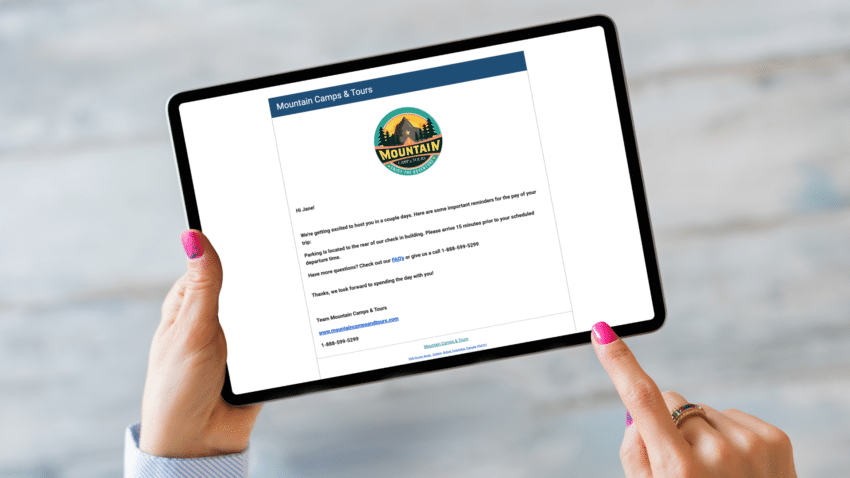As a tour guide, you are a part of the hospitality and customer service industry and we know it isn’t always easy. We’ve all heard the horror stories; demanding clients, late arrivals, unsatisfied customers, and troublemakers.
We wanted to help you out, so we’ve come up with a useful guide that will help you deal with “eccentric” customers and, overall, be a successful tour guide.

Don’t Just Be a Good Tour Guide, Be a Great Tour Guide
There are thousands of good tour guides out there, but don’t just be ordinary, be extraordinary! Learn what the difference is between a good tour guide and great tour guide.
1. Introduction
A Good Tour Guide: Introduces themselves, welcomes you to the tour, and gives a brief breakdown of the schedule.
A Great Tour Guide: Gets to know their tour group.
Action Step: Ask where your group is from, why they’re visiting, and what their interests are.
Get the group to get to know each other
Action Step: Play a game of Elimination Rock, Paper, Scissors, where you get everyone to pick someone to play against. The loser stops playing while the winner continues to play with another winner until their are only two people left. This is a great way to break the ice in a short time, without too much small talk. Maybe even think of a small prize to award the winner.

2. Sight-Seeing
A Good Tour Guide: Shows his/her group all the sights on the tour.
A Great Tour Guide: Maximizes enjoyment on the tour
Action Step: Do some research to map out when the best sights will be the least crowded.
Listens to what his/her group wants
Action Step: At the request of one of your group members, show any additional sights that they want to see.
Recommend the best places to eat, shop, and buy souvenirs
Action Step: Recommend the best places to eat shop and buy souvenirs. Don’t base your recommendation off of a commission you may receive from a store. Travellers have a good sense for when they are being pushed into a retail situation that benefits the guide. Emphasize quality and experience.
3. Time Management
A Good Tour Guide: Will make sure that you stick to the schedule and see all the sights on time.
A Great Tour Guide: Is Flexible
Action Step: Be aware of the start and end time of the tour but if your customers are enjoying a particular sight, let them stay a while.
Doesn’t Rush
Action Step: Don’t rush your customers, remind yourself that you are on their time.
4. Commentary
A Good Tour Guide: Gives a basic historical and cultural background of the sights.
A Great Tour Guide: Is a story teller
Action Step: Be passionate about your story telling – Use arm gestures, a high speaking volume, and facial expressions.
Watch this video on how to be a great story teller
Integrates personal anecdotes
Action Step: Tell your group your personal thoughts on the good, the bad, and the ugly of your city – trust me, they’ll laugh!
5. Local Knowledge
A Good Tour Guide: Is familiar with the city and/or country of the tour.
A Great Tour Guide: Is a traveller
Action Step: Include stories from your own traveling adventures.
Really understands the city and/or country they are guiding
Action Step: Highlight the uniqueness of the city and/or country compared to other cities and countries.
6.Conclusion

A Good Tour Guide: Says his/her closing remarks and thanks you for coming.
A Great Tour Guide: Cares about the rest of his/her group’s trip
Action Step: Reccomend other sights, restaurants, etc. that you didn’t get to show them on the tour.
So there you have it- the difference between a good tour guide and a great tour guide.
Another factor of how to be a great tour guide is how you deal with difficult customers.
How to deal with customer complaints and late guests – two very common occurrences on tours.
How To Deal With Complaints
Working as a tour guide in the hospitality industry means that the customer is always right, even if they’re wrong.
Learn how to deal with customer complaints as democratically as possible with these tips and tricks.
Run a Great Tour
Instead of putting out fires, prevent them! Right from the start, be a professional, organized, and fair tour guide. Don’t give your customers anything to complain about!
Be Clear About Your Complaint Policy
During the introduction of your tour, be clear about your complaint policy.
Explain:
- That you will do your best to make everyone on the tour happy.
- That you are willing to hear what everyone has to say.
- That you will respond as quickly and fairly as possible to the complaint.
- The procedure the guest has to follow to file a complaint.
- How you and your team will respond to the complaint.

Be Professional
Since it can be difficult to deal with angry guests, train your staff ahead of time so that they are familiar with the procedure on how to deal with complaints.
Here are a few good rules of thumb to follow:
- Respond quickly: The guest will want to feel like you heard them and that you care about their complaint. Dealing with the complaint quickly also means the customer is less likely to post their complaint on a site like TripAdvisor.
- Show your guest that you are listening: Use your body language to show the guest that you are actively listening to their complaint – Nod your head, keep eye contact, and verbalize that you understand.
- Thank your guest: Thank your tour guests for raising their concerns.
- Be patient, calm and empathetic: The guest may be acting unreasonable, but that doesn’t mean that you should too – If you remain patient, calm and empathetic then they will likely mimic your approach.
- Verbalize how you will manage the complaint: Letting the guest know what your plan is to manage the complaint will make them feel satisfied. Breakdown what happens next and when.
- Involve your guest in the solution: Ask them if there is anything that they would like you to do to solve the problem.
- Update your guest on the status of their complaint: Let your guest know that you haven’t forgotten about them and where their complaint is in the filing process.
Follow Up
Send a follow-up email asking your guest how they are doing – If necessary, send a discount or promotional offer.
Remember that your reputation is on the line and unhappy customers will likely share their tour experience – So deal with complaints as best as you can!
Another difficult situation that can arise when running tours is late guests.
How To Deal With Late Guests
Organizing a large group of customers comes with a set of challenges – late guests being one of them.
Learn how to deal with late guests with these 5 tips and tricks!
Set Precedent
Set a time that the tour starts and make sure the tour actually starts at that time – As the tour guide you should be there about 15 minutes early to prepare anyways.
Being at the start location on time and starting on time shows your guests that you are taking your job and the tour seriously.

Set Reminders
Communicate as much as possible with your guests – Along with the tour’s itinerary, send text or email reminders 3-4 hours before the tour reminding your guests of the time and the location.
Be Strategic
Choose a strategic location for the start of the tour – Choosing a place that is difficult to find will increase the likelihood of late guests.
Send a map with a clearly marked route to the start location.
Be Prepared
Prepare a system for your late guests – Let them know where they can reach you or the tour office to find out your next location
Or send them the times and locations of all the spots on the tour so that they can meet you there.
Be Clear
If there is a crucial time and place that all the guests must be – for example, if the van leaves at 8:30 sharp, be clear and emphasize this point!
Remind them a few times that if they aren’t there on time, they will be left behind, but in the nicest way possible, of course.
Check out these 5 resources that can help you be an even better tour guide.
Search The Blog
Categories
Most Popular Articles
- Set-jetting, Forest Bathing, and Hush Trips: 20 Innovative Tourism Business Ideas and Trends for 2023
- Your Marketing Mix: the 7 Ps of Travel and Tourism Marketing
- Advantages and Disadvantages of Online Travel Agencies (OTAs)
- How to Create and Promote Amazing Tour Packages
- The Ultimate Free Guide to Starting a Food Tour Business





